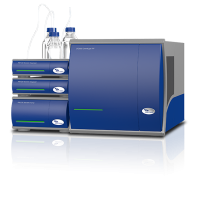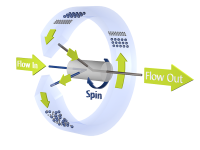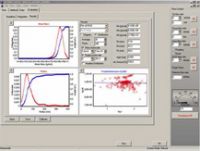CF2000 Centrifugal FFF
The most Advanced System for High Resolution Separation and Fractionation of Nanoparticles!
Principle and Advantages of CF3
The advanced Postnova CF2000 Series was developed to become the first professional modular Centrifugal FFF system available. It is completely controlled by the NovaFFF single software platform which runs the entire system from autosampler to detectors. The CF2000 Centrifugal FFF incorporates the combined proven know-how and the technologies from three decades of leadership in FFF. Due to its unique design, the CF2000 Centrifugal FFF system offers more flexibility, higher robustness and better performance than traditional particle sizer systems. The CF2000 allows high resolution particle separation and sizing at the same time and consequently sets a complete new standard and offers a real alternative to traditional particle characterization techniques.Broad Separation Range
The CF2000 system has a wide separation range and is able to separate smaller species, such as proteins and polymers, from larger particles in one run with high resolution. The system is ideal for nanoparticles and is also suitable for the microparticle range. Typical samples for the CF2000 Centrifugal FFF are latex, silica, TiO2, ZnO, Ag and Au particles. But also sediment and various organic and inorganic particles from surface, ground and waste waters can be separated and further analyzed after fractionation. In contrast to traditional particle sizing techniques, which work in the batch mode, the Centrifugal FFF technique physically separates each particle fraction prior to sizing. This avoids numerous disadvantages of the batch techniques such as low size resolution, discrimination and underestimation of smaller by larger particles. Same as with Flow FFF no special sample treatment is necessary as they can be injected directly without filtration, allowing the characterization of quite complex particulate sample systems without alteration and damage.Particle Size and Density Separation
The CF2000 Series system is based on the Centrifugal FFF principle using a centrifugal field as driving force for the separation. Particles affected by this field are separated by Dynamic Diffusion on the basis of both the Particle Size and Density. This unique feature allows the separation of different particle materials having the same particle size. The separation can be further optimized by the use of different eluents and various temperature programs. Therefore, the CF2000 can be ideally used for separation of complex particle samples in the area of Environmental, Food-Agro-Cosmetics and Nanomaterials.Advanced Centrifugal FFF Detection
In order to enable the user to fully access this wide application range, the CF2000 Centrifugal FFF is available with various add-on modules and special FFF detectors, such as Refractive Index (RI), Multi-Angle Light Scattering (MALS) and Dynamic Light Scattering (DLS). All Postnova FFF modules and FFF detectors have been especially designed for FFF and been optimized not only for the use with the CF2000 Centrifugal FFF but also for the other Postnova FFF versions. Additionally, the CF2000 Series has been designed for easy interfacing with existing high-end detection technologies from leading instrument suppliers so that the user can ideally integrate the Postnova FFF technology into the existing laboratory infrastructure in order to maximize efficiency and investment.


CF2000 - Unique Worldwide
High Resolution Separations
Centrifugal FFF differentiates itself from the various particle size analyzers which are available on the market because of its ability to deliver true high resolution particle size separations. Centrifugal FFF uses no assumptions or algorithms but just separates the single particles fractions with extremely high resolution.Broad Separation Size Range
The CF2000 technology allows separation of small, medium and large particles at the same time in just one analysis and avoids the discrimination of smaller particles by larges species which is often a limitation in light scattering based techniques.Separation under Native Conditions
Using the unique unpacked and open Centrifugal FFF channel allows the user to employ “any” kind of eluent which is ideally suited for the sample particles. Kinetics and behavior of particles under certain conditions, such as pH, ionic strength, etc., can be investigated easily by using the CF2000 system.Separation of same Size Particles
Because Centrifugal FFF separates by size and density, it is possible to distinguish particles of the same size which have different chemical compositions and structures.Flexibility & Interfaceability
The CF2000 Series was developed to be used as a modular FFF system which can be interfaced with existing other detection systems, such as UV, DLS, MALS, SAXS. This way, Centrifugal FFF can be used as a high resolution size fractionation system which then can be combined on- or offline with high resolution detection systems that provide an ultimate 2D view of any sample system.


NovaFFF Software
The NovaFFF software is based on a “one Software for all devices” strategy, incorporating system control, data collection and data evaluation as well as reporting.The easy to use NovaFFF Software:
- Very flexible: simple integration of hardware components e.g. autosampler, pumps and various detectors
- Important security and monitoring functions: pump and channel pressure, manually or automatically shut down of the system when a set maximum pressure value is exceeded
- Run data file: pressures, flows and additional analog detector signals are stored
- Log history file: main actions and controls are logged
- PC and LAN controlled: integration within the companies local network (LAN) with own IP address for every FFF system. State-of-the-art communication protocols using TCP/IP
- Unique FFF-LS Integration: controlling the FFF platform together with Light Scattering detector in just one application
No more start-up of two programs, copy and paste of methods between different programs or problems about the stability of the multitasking capabilities of the PC operating system when using NovaFFF.
Required Modules:
Sample Organisation:
Detectors:

Applications:
Proteins, Antibodies, Antibody Aggregates, Viruses, Liposomes and Drug Delivery- Environment
- Food-Agro-Cosmetics
- Nanomaterial Analysis
Environmental Conditions:
Relative humidity 20 – 80 % (non-condensing) at an operating temperature range of 10 – 30 °CMeasurement Range::
Nanoparticles: 10 nm - 20 µm (Depending on sample material and density)Channel Cartridge System:
- Inner Volume: approx. 2.7 mL depending on spacer
- Inner Channel Thickness: 250 µm (others available)
- Channel Diameter: 200 mm
Applicable Solvent Systems:
All typical organic and aqueous solventsConnected Detector Systems:
The following detection technologies can be used in FFF:- Dynamic Light Scattering – DLS
- Static Light Scattering - MALS
- UV/VIS Absorbance
- Other Technologies: Please inquire on compatibility.
Flow Rate Ranges / Pressure:
- Main Flow 0.3 – 4.0 mL/min at channel outlet
- System Pressure up to 8 bar
Centrifugal Force/Rotation Speed:
- Centrifugal acceleration 11 – 26369 m/sec²
(approx. 1.12 – 2688 g) - Maximum of 4900 rpm
- Constant, linear or exponential decay field
Required Analysis Time:
Typically 30 - 90 minInjection Volumes:
Typically 10 – 100 µLInjection Method:
Via manual injection valve or via PN5300 autosamplerSoftware System:
Unique NovaFFF software platform for complete system control, data acquisition, evaluation and report functionsPower Requirements:
100 – 240 VAC @ 50 – 60 HzPC Requirements:
Windows XP, min.1024 MB RAM, 1 RJ45 Ethernet LAN interfaceDimensions (DxWxH):
660 x 405 x 420 mmWeight:
45 kg


